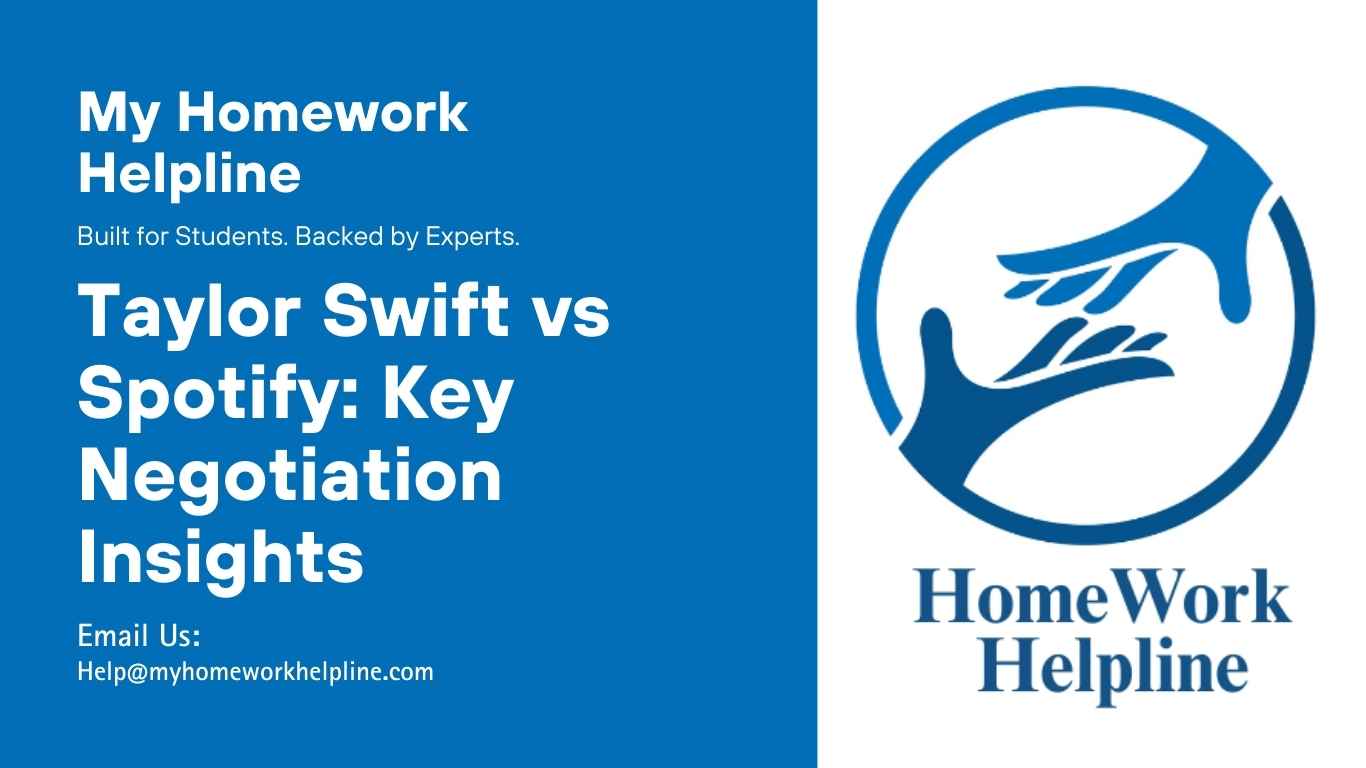Taylor Swift vs Spotify: An In-Depth Negotiation Analysis Essay
The negotiation involved Taylor Swift, a renowned country-music artist, and Spotify, a digital music company. Swift initiated the negotiation after she released her best-selling pop album, “1989” in October 2014. The singer had to maximize her earnings, while the digital music provider also aimed to increase revenues from the sale of Swift’s album. The contentious issue was how Spotify compensate artists for the sale of their music. Swift demanded that Spotify allow only paid subscribers to stream her new music, free of advertisements, but Spotify insisted on allowing also non-paid subscribers to access the plus ads music (Shonk). Accordingly, the 2014 Taylor Swift vs Spotify negotiation emerged over the pricing of protected content in the digital world.
Struggling with business studies assignments on negotiation case studies? Our business studies homework help provides professional assignment assistance, detailed essays, and expert homework support to help you understand complex scenarios like the Taylor Swift vs Spotify negotiation. Whether you need help analyzing bargaining power, timelines, or outcomes, our team ensures you submit high-quality, well-researched work that meets academic standards and deadlines. Get the support you need today!
Spotify exhibited the strongest bargaining power. Majer et al. suggest that incentive structures shape negotiation outcomes. In this regard, Spotify capitalized on the subscribers’ willingness, which is Swift’s weakness. Spotify tackled the dispute by launching campaigns purposed to win as many Swift’s fans as possible and modified its business models to entice Swift and other famous artists to stick with Spotify (Shonk). The elimination of Spotify’s free tier was ultimately at stake and the two sides failed to agree. Consequently, Swift and her record label, Big Machine, moved out of Spotify, which significantly undermined Spotify’s financial performance.
Outside influences significantly impacted the Taylor Swift vs Spotify negotiation. The outcome of the negotiation relied heavily on the conduct of the subscribers. Swift enjoys an undisputed big fan base to influence deals, such as boycotting Spotify (Sweney). Moreover, the competitive advantage of other music streaming companies shaped the negotiation. For instance, other streaming outlets agreed to Swift’s demands and thus retained access to Swift’s catalog (Shonk). The negotiation was meant to take less than one year. However, its effect lasted up to 2017. After the three-year boycott, Swift returned her music to Spotify upon influencing music streaming companies to consider compensating artists during users’ free tier access (Sweley; Nicolaou). Ultimately, despite losing the deal at the onset, Swift won for herself and other artists in the long run.
Works Cited
Majer, Johann M., et al. “Conflict Strength: Measuring the Tension between Cooperative and Competitive Incentives in Experimental Negotiation Tasks.” Collabra: Psychology, vol. 8, no. 1, 2022, https://doi.org/10.1525/collabra.35330.
Nicolaou, Anna. “Can Scarlett Johansson Take Down Hollywood Studios?” Financial Times, 5 Aug. 2021. https://www.ft.com/content/1550ed57-047f-46dd-a9a0-121406199076. Accessed 29 Jan. 2023.
Shonk, Katie. “The Importance of Power in Negotiations: Taylor Swift Shakes it Off.” Harvard Law School, 23 Nov. 2020, https://www.pon.harvard.edu/daily/dispute-resolution/dispute-resolution-with-spotify-taylor-swift-shakes-it-off/#:~:text=Spotify%20denied%20Swift’s%20request%20to,new%20music%20its%20listeners%20crave. Accessed 29 Jan. 2023.
Sweney, Mark. “Taylor Swift Strikes a Blow for Fellow Artists as Digital Revenues Soar.” The Guardian, 24 Nov. 2018, https://www.theguardian.com/business/2018/nov/24/taylor-swift-blow-fellow-artists-streaming-revenues-soar-universal-spotify. Accessed 29 Jan. 2023.

